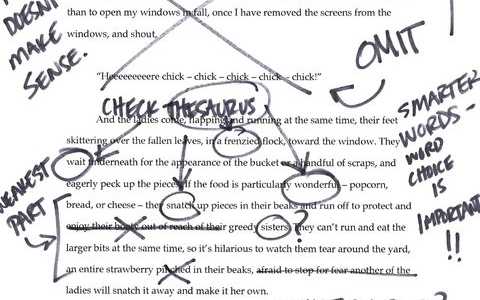A Writer’s Essential Steps to Staying Motivated
Writing doesn’t occur solely when inspiration strikes; it is often painstakingly crafted because of deadlines. Since ideas do not always come when needed, it is important to keep up one’s focus and motivation levels because these are some of the keys professional writers need in their toolkit. Staying focused and motivated is an increasingly hard battle to win, what with the ever-growing amount of gadgetry and software programs purposefully created for distracting people. Additionally, writing is a solitary profession that can cause people to become their own worst enemy when left too long with their thoughts. But, rest assured, there are many methods to creating effective writing habits.
Bringing the Inner Self Out
Before beginning to write or assemble ideas, writers should look inside themselves and question what it is that is making them feel unmotivated. One of the common reasons is the fear of not being a good writer. To deal with a lack of self-esteem, question what makes a writer ‘good’. Anyone can learn how to write well and use the many boring grammar and syntax rules, but the fundamental aspect of a writer is how they write. A good writer has an underlying passion that is able to make their audience feel their writing.
Another general reason for becoming discouraged when writing is when one’s work is judged by others. There is constructive criticism and there is destructive criticism. Constructive criticism is given to improve one’s writing; destructive criticism is a mixture of insults and jealously that aims to kill good writing. Realizing the difference and maintaining confidence in one’s writing capabilities will help block the effects of destructive criticism. It is because of destructive criticism that writers need support, and what better place to find it than in a circle of writers. They are found on LinkedIn, forums, writing-themed blogs and in writing associations.
People who feel as though they are not good enough to be a writer should compare their work to that of other writers on the same level. Writers who are trying to publish their first novel should not compare their work to writers who have several books already published. In this case, mentoring could be one option to getting a writer motivated and writing. One can ask an established writer for counseling or even aid them in their work.
If a writer is not feeling motivated because they are too busy with commitments, then the solution is simple: reduce the amount of activities one is partaking in, or reduce the amount of time set for each activity.
Getting Started
When grade school teachers assign a paper and supply the subject, the hardest part has already passed. However, when professors in universities assign a paper, students often panic and spend days trying to figure out the topic on which they want to write. For those times when a writer must bang out a story or article and hasn’t the slightest clue about what they want to write, the first place a writer can turn to these days is the internet. It is a wonderful place to find the perfect seed and help it grow.

The book series of writing exercises called Now Write! is a great permanent tool a writer should have in their kit. It’s helpful for getting started whether science fiction, fantasy, nonfiction or mystery is the genre in question. Each chapter is about a method an author uses to practice their writing and develop ideas. Additionally, each section focuses on a writing element, such as setting, plot and point of view. One fiction writing exercise is about how a character would react to something unexpected in their setting; this allows for a fuller development of the character.
Writers are observant and for those times when they are away from their desk, it is imperative that they keep a notepad on their person for when an interesting detail or plot development comes to them.
Organizing
There are various ways to organize the details of a story when in the brainstorming stage, for instance, categorized lists or a tree outline. For people who need more of a visual display to get into their story, drawing characters and creating blueprints breathes life into the story. They help writers describe characters and settings realistically which readers will notice and appreciate.
When it comes to novels, it’s handy to create a story bible or book bible that has all the facts of a story’s characters, settings, plots and subplots, research and any potential ideas for the story’s development. A writer may think that they will remember their characters’ details since they are the ones who thought them up, but after a few revisions of the manuscript, the memories fade. A story or book bible also saves time later when copyediting and writing later novels in the series.
Doing the Writing
Environments have a heavy presence in the writing process. Before one sits down to write, it is important to detect potential distractions and to deal with them. If sound is the issue, ask the people in the environment (for instance, one’s home) to lower their voices or music. There are several alternatives to this, such as the use of ear plugs, the use of headphones and the playing of one’s own music, or a relocation. Writers must remember that when they are in an agitated state or in a tense environment, one cannot write or at the very least, one cannot write well. In this circumstance, it is best to leave the writing for another time.
If a writer can concentrate better with white noise, then cafés, food courts and parks are appropriate places to write, whereas if the writer needs absolute quiet, libraries are perfect places to which one should go.
It is not recommended to do writing with friends around if those friends are not needed to contribute to one’s writing because they will want to talk. Writing in this type of environment is like swimming against the tide, so scheduling one’s writing for another time will be a smart decision in the long run.

The only way writing is accomplished is by sitting down and doing it, which means do some writing each day or every two days. By setting a certain amount of time, the writer uses the BOC (butt-on-chair) or BIC (butt-in-chair) method. Both methods are the same; it’s only the letter in the acronym that differs. Additionally, if one manages to write beyond their established writing time, then it is best to not stop the flow. However, for the next day’s writing period, one should not write less simply because of the previous day’s overtime.
Using a rewards system to motivate one’s writing is not recommended. The object of this system is to write a certain amount of words or pages in a set amount of time, enjoy the reward and repeat the process. However, the object of the system is soon changed from writing to simply having the reward because one’s mind becomes distracted with the reward’s existence.
Customizing Methods
Remember that everyone is different so customizing a method for writing is essential. Some people are too tired after their day job to do any writing therefore, they would be productive if they scheduled a writing period in the morning or during their lunch break. Figuring out one’s best time for thinking clearly is key to advancing in the writing process.
Music and films are other personal choices. While the sound of nature or the hustle and bustle of a coffee shop may appeal to some, others need music or silence to focus on their writing. When the ideas in one’s head dry up, writers should take this opportunity to experience someone else’s work which may lead to new ideas for one’s stories. Films about writers that can refuel one’s writing passion are Midnight in Paris, Finding Forrester and the 2013 version of The Secret Life of Walter Mitty.
There is a debate on whether writers should have a direction for their story prior to beginning their writing. Some believe that when one does not know their story’s direction beforehand, then the story will never get finished, but that isn’t necessarily true. There are many factors that can stop a story from being completed, such as a lack of motivation in the writer. Therefore, whether a writer has a direction or not should not matter. As long as the writer writes and grows their ideas, they’ll be alright.
Editing
Editing has become a little easier to do with the existence of the internet. One no longer has to go out and buy a dictionary or grammar book to know how to spell and how to punctuate. But for the professional writer, it’s a good investment to have these books on one’s shelf. The internet is full of different opinions, leaving one wondering if the answer they find is the best or right one. Books, however, offer a concrete answer, such as the English Simplified series by Blanche Ellsworth and John A. Higgins. It provides comprehensible grammar rules, source citations, manuscript writing tips and much more.
When using the BOC/BIC method, it can happen that nothing comes to mind during a scheduled writing period. Should this happen, it is best for a writer to turn to editing or researching. That way, the work will still have progressed despite the writer not having written anything new.

Returning to edit one’s work after a day or two ensures that the writer will be able to look at it with fresh eyes and catch missed errors. One can also have another person or several persons look it over; although, this is a tricky process. Edits suggested by others may not be good for one’s work. It all depends on the genre or the voice used in the story. That is why it is important to have people writing in the same genre to edit and critique one’s work.
“Make Good Art”
Good writing takes time and a lot of effort, but it shouldn’t be just about the struggle. Writers need to stop and enjoy their work. The books in shops and libraries are just the end product of months and years of labor. Writers must have a driving passion that makes them want to write. This passion is what allows them to be receptive to motivational methods in the first place.
So if those reading this article want more motivational methods, just listen to Neil Gaiman’s advice:
What do you think? Leave a comment.











I’ve found that the best way to get myself motivated is to concentrate on one part of the story, so I usually start with scenes.
Everyone has different and very personal ways to arrive to the same place. Most of the recommendations I find do not work for me, but work well for others.
When I write, it’s like I’m watching a movie in my mind and using the keyboard to describe what I see–and that is typically enjoyable, no matter how rough it might also be. Even when the words feel like blood being squeezed from a turnip, my own desire to keep “watching the movie” to the end typically keeps me going.
For me, getting myself writing is always returning to what inspired me to start working on the project to begin with and find that again. Once I remember what made me feel like “this story needs to be written and I’m the only one who knows it!” it’s a lot easier to get back to work on the book that I’ve been putting off. Almost, in my mind, I feel like I owe it to my story, to my characters. Having that kind of respect for what I’m working on always brings me back to it no matter how hard it might be. It would just be a shame for it to not be finished and it’s silly of me to try and pretend that I don’t want to write it. That’s enough for me to always get back to it.
Another tactic, beside that inward motivation, is that I always do a lot of prep work before I write. Right now my outline/changes for the book I’m working on are at my left elbow, the hard work I’ve already done, all I have to do is write.
This was very lovely. I always have spurts of motivation and the most inconvenient times that it is often hard to find that motivation again when the time is right.
Glad you enjoyed it!
I find writing to be a great creative release and most of the time there are ideas inside that need to come bursting out. Needless to say, these creative bursts don’t come according to timeline and I am a slave to the artistic impulse. Frustrating at times because most of the time I have no shortage of ideas. It’s the narrowing down that is my Achilles heel.
I often get ideas that will occur later in my story so I keep a notebook on me because I feel as if the ideas will take up room in my mind or I may lose them. When I have ideas I can’t use, I keep them in case I can use them for another story.
I’ve definitely been struggling lately with not liking writing. My boyfriend is a musician who loves going to band practice and loves working on his music every day. I dread writing, except when I sit down and actually do it. I think the most poignant part of what you wrote was the last part about working on something you love. Writing is painful for me (or the thought of getting started) but the only thing that gets my butt in the chair is the idea that I get to hang out in a world that I like hanging out in.
Oh yeah, I feel you! I love writing, but there are times where I just don’t have the energy. It’s hard getting in and out of the story. Being inside is the best.
Wow, I can relate to this tremendously! Writing can sometimes be painful, and this can sometimes put one off into thinking “why do I write in the first place?”. But writing is something I yearn to do. Once you get into physically writing, all the doubts seem to float away.
Great article, Jenny!
Having a writing partner is motivation for me. I don’t like keeping him waiting for something I should have done two weeks ago.
When I’m feeling emotional or feel like I came up with the perfect words in my head, even if it doesn’t fit with what I’m working with at the moment, I write it down and save it for another day and another story. I came up with my most beautiful words and poems that way.
It comes out of nowhere sometimes.
Excellent! I also experience that. Readers will feel your words more easily.
Thanks for sharing such an informational article. The article is really well structured and portrays a positive picture of motivation!
Thank you very much!
Thanks a bunch for the motivational boost. I’ll get started right away!
Your welcome. Happy writing!
I use a ‘whip’. That is the person that I set my deadlines with and then that person cracks the whip if I start slipping and missing those deadlines. Makes me accountable to someone other than myself.
One thing I did to help me commit to writing was to make myself accountable to someone, namely my significant other. Each week I send him an email with the progress I’ve made. The report and the accountability is more for me than for him, but it feels much more motivating to try not let him down than it does to just try to not let myself down.
I just started writing/blogging last December and I would post sporadically. Right now I’ve changed my game plan into posting at the least 3 times per week. I’m also training myself to write something everyday – be it an idea, a draft or a post to publish.
That’s great! Keep up the good work.
One thing that work wonders for me is to write with my writing buddy. We normally schedule one fix day of the week, where we first chat and update each other on other stuff, then we write, discuss the writings and ideas, eat some, write more, and most importantly – chair each other and tell the other one who good we just did!
I’ve always had trouble writing with another person or persons, but if it works for you guys, then awesome! You guys sound dedicated.
I have been a sporadic writer since graduating college and moving back home. I think my family doesn’t quite understand the definition of solitude. I need to spend more time focused on my writing as if it were (because hopefully it will be) a second job. I want to make a career as a writer and my first step is removing myself from distracting situations! I don’t want to push the blame, but my family has a tendency to always want to be around. I need to move out of that frame of mind and know that I am not going to hurt their feelings. This is my job and my future. No excuses!
Yes, it is hard working with family around. Even mine doesn’t seem to get that I need quiet to write. I applaud your determination and dedication. Keep it up!
What is wrong with you people?
Writing is the funnest thing in the world (whether outlining, drafting, revising, critiquing–all of it!) My problem comes with making myself stop and actually live the rest of my life. I would write all day long if I could.
Thanks for posting.
You’re welcome. It was my first article.
I post short stories onto a blog or epub website weekly. I’m able to keep up the pace by imagining an audience with a very short attention span hanging out for my post.
In reality, it is probably just my wife, my mother, and an odd uncle. Motivating nonetheless.
Thanks for the post. It helps a lot.
You’re very welcome.
Love these tips. Another thing I’ll do is to not write for a day or so. If it feels forced, it’s not going to be my best work. It’s amazing how much I can not wait to sit down and write after a couple days away from my blog though.
I try to remember that these cool characters that exist in my head won’t be known by anyone unless I get them down on paper and give them a cool story. Also, in my experience, the hardest part is to get started. Once you are in the mode, writing is easier, even fun. I suppose, perhaps, it’s like running. Getting out of bed and putting on your running shoes is the tough part. Once you are out there, whew! Although I don’t run and have no intention of ever running, so my comparison may be whack.
I am co-writing a biography and ghostwriting a western novel, plus working on a children’s book. It’s frustrating because I work such long hours and have nothing tangible to show for it
That does sound tough. Try to do some writing everyday. Little by little, things get done. Don’t focus on how much you haven’t done, but how much you have done.
I like the article, and the one thing that I would state, if only for myself, is structure, structure, structure, and spontaneity of course. I have to set up a specific time to write and make it a habit, rather than something I must motivate myself to do. I haven’t mastered that yet — at all.
Thank you for the article. I’ve never been good at keeping myself in a steady regimen, so I will start thinking about your helpful words to keep me on track.
I’m glad you found it helpful. Good luck!
Ecxellent article! I found this to be super helpful!
Thank you!
I have a terrible habit of blogging with the television blasting. I wonder how I compose the articles I do. I wonder how much better I’ll do if I shut out all distractions.
We’re all different. Some people are able to do their best work under pressure and, in your case, with distractions.
While I encourage any and all to take up writing, what galls me is how people who’ve never set pen to paper assume they are going to become a fabulously successful writer overnight. Sigh.
At least they’re optimistic.
Loved this. Really well done. The Neil Gaiman video at the end was a very great touch. Make good art, indeed.
Thank you. I found true inspiration in his speech.
Thanks so much for the helpful tips.
You’re welcome. I’m happy my article has received so much feedback.
This is a lovely and helpful article. I am always more of the stick-to-the-outline type of writer than just-let-your-ideas flow. Good article, and thank you for the tips!
Happy to help!
nice post..
Thanks.
Just keep writing, just keep writing.
very helpfull
Great content.
I feel this! thanks for sharing your thoughts 🙂 the danger is that I often get too distracted by the internet, haha.
These tips are the real rule of writing and I personally feel most of the writers follow the same steps mostly. A real motivational thing that keeps myself motivated is when I think about serving this world outside through my writing. Its a powerful thing in itself when you are up to servie the socity with your writing and the appreciation that follows!
These tips are the real rule of writing and I personally feel most of the writers follow the same steps mostly. A real motivational thing that keeps myself motivated is when I think about serving this world outside through my writing. Its a powerful thing in itself when you are up to serve the society with your writing and the appreciation that follows!
Thank you, these types of things are always worth reading as a writer. My issue is I forget how much I enjoy writing, and goes ages without it, then have spurts of writing into the night!
This is a very useful article. I have been struggling all summer to find motivation and ideas for writing, and to stay focused. These are very good tips and I plan to come back to this article a lot. Thanks so much!
Good
When you write you have to be precise and to weigh, select, reject and organize your ideas into a coherent pattern of your own.
This article tends to be very fascinating as it gives many different techniques on how to write well. The idea that writing doesn’t only come with courage but it also requires the effort and the time you put into it. Whenever I write, I always brainstorm my ideas before I dive into actually writing. I find this article very helpful because it motivates me to write more with strong dedication and desire.
I am so happy to hear that! Thank you.
I frequently find that the very desire to feel motivated can be the greatest obstacle to genuine motivation. A quasi-zen attitude to motivation can be unexpectedly beneficial. In other words, as some zen masters have said “the more you let It go, the more It comes back to you.” Detach yourself from the idea that all writing must be fuelled by an unyielding passion/motivation and you’ll find that motivation comes to you almost unwillingly. Just write. What if it’s terrible? Doesn’t matter. Just write.
This article gave very good pointers on how to tackle writing. As a college student currently enrolled in a English where papers have to be written frequently, it can get difficult to write. I will use what I learned in this article to make my writing style better. This will defitnetly be my go to guide when I’m writing an assignment!!
I am a writer at an academic firm with having 15 years of experience. These tips are great. Keep it up 🙂
Like a few others that commented, I too am an undergraduate studying English. I often have to complete a paper in one sitting, which is not common with a lot of my peers. After I have finished, I will go back and edit. I have this groove that, for some reason, I cannot disturb. Every once in a while I cannot find this groove, but being in a quiet place and browsing the internet usually is helpful. Great article!
I follow each of these concepts when doing my writing but sometimes I do them out of order making things a little chaotic for myself. This is my organization, though, depending on what I’m writing I also just start writing whatever comes to mind regardless if it makes sense or is relevant. Making sure to have the timing or your writing be on track and consistent can make things easier and one may produce a more productive piece of work. Reviewing you’re writing before continuing where you left off can help spark new thoughts, ideas and correct any errors you may have missed the first time.
Great article, I myself am a writer in college so this helps me out tremendously.
It’s always best to motivate yourself through a strategy that you came up with yourself! That way it’s more of a confidence booster when your strategy works, and you can more easily perform it yourself then trying to mimic someone else.
This article spoke to my SOUL! It’s not easy being a writer. The thing that was mentioned from staying motivated, digging deep into your inner self and being organized is very, very important when writing. I do feel like although anyone could possibly be a writer, it is definitely a gift for those that truly have a passion for it. All the information that goes around the world even having this platform stems from writers. Thanks so much for sharing!
Thank you for the clear and useful tips! Writing can definitely have a love/hate component to it. I especially appreciated the supportive ethos of the ending video to go forth and make interesting mistakes… and make good art.
The only time I have been unable to bring out my inner self was when my professors set a deadline for my papers. Then it was like a total system shut down. Until after the due date, that is. Maybe some of you know what I’m talking about.
Whenever I think about writing, whether it be a story or an essay for school, I always end up not doing it. At the slightest whim of thinking I should write, I do. I found this to be the best method. Just do it, don’t think about it. Just sit down and write and whenever I do just sit down and write, it always ends up being really successful and rewarding. Big fan of the B.O.C/B.I.C method 10/10 recommend.
I have a basic plotline and then write scenes. I find that works better for me than writing in a linear fashion.
This article gives some lovely ideas! I have coursework for my Creative Writing AS due next week. I’m submitting a poetry collection and a short story; I find it much more difficult to produce a solid plot for the story though. I really like the idea of writing notes on characters, it should be very useful; thank you!
I feel like making an outline of what I want to write is a good motivator for when I have writer’s block. It also helps the main story always be in focus whether it’s in the foreground or the background.
Good post. I believe it will provide much help for me to improve my writing skills being motivated at best level.
Really loved the different ways of bringing about writing. I’ve struggled with the motivation, despite the stories bubbling up – even turning to film-making as a different medium to storytelling. But I need to get back. This article was really helpful!
Great article – lots of good advice and methods to keep up motivation that I need to try out for myself. It can definitely be a struggle to keep the motivation going, but I think pinpointing the underlying cause of it is a really good idea. Thanks for introducing me to the Now Write! series, too – lots of interesting exercises for anyone looking to write that first novel!
The only method that works for some: feeling terribly unaccomplished by looking at unfinished work.
This made me get pen paper and start writing again after a gap of two years. Thanks!
I’m so happy to hear that! May the writing forces be with you 🙂
I’m often approached by young writers to ask for “tips” on writing and I tell them: you can study and pontificate and theorize and plan and do all that shit for years, but at the end of the day what matters is whether or not you sit your ass down and write. That’s all.
good article
A good essay and a good expression “Make good art.”